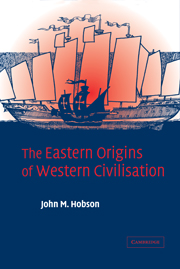Book contents
- Frontmatter
- Contents
- List of tables
- Preface and acknowledgements
- Map: Hobo-Dyer projection of the world
- 1 Countering the Eurocentric myth of the pristine West: discovering the oriental West
- I The East as an early developer: the East discovers and leads the world through oriental globalisation, 500–1800
- II The West was last: oriental globalisation and the invention of Christendom, 500–1498
- III The West as a late developer and the advantages of backwardness: oriental globalisation and the reconstruction of Western Europe as the advanced West, 1492–1850
- IV Conclusion: the oriental West versus the Eurocentric myth of the West
- Notes
- Index
1 - Countering the Eurocentric myth of the pristine West: discovering the oriental West
Published online by Cambridge University Press: 22 September 2009
- Frontmatter
- Contents
- List of tables
- Preface and acknowledgements
- Map: Hobo-Dyer projection of the world
- 1 Countering the Eurocentric myth of the pristine West: discovering the oriental West
- I The East as an early developer: the East discovers and leads the world through oriental globalisation, 500–1800
- II The West was last: oriental globalisation and the invention of Christendom, 500–1498
- III The West as a late developer and the advantages of backwardness: oriental globalisation and the reconstruction of Western Europe as the advanced West, 1492–1850
- IV Conclusion: the oriental West versus the Eurocentric myth of the West
- Notes
- Index
Summary
History cannot be written as if it belonged to one group[of people] alone. Civilization has been gradually built up, now out of the contributions of one [group], now of another. When all civilization is ascribed to the [Europeans], the claim is the same one which any anthropologist can hear any day from primitive tribes – only they tell the story of themselves. They too believe that all that is important in the world begins and ends with them … We smile when such claims are made [by primitive tribes], but ridicule might just as well be turned against ourselves … Provincialism may rewrite history and play up only the achievements of the historian's own group, but it remains provincialism.
Ruth BenedictWe have been taught, inside the classroom and outside of it, that there exists an entity called the West, and that one can think of this West as a society and civilization independent of and in opposition to other societies and civilizations [i.e. the East]. Many of us even grew up believing that this West has [an autonomous] genealogy, according to which ancient Greece begat Rome, Rome begat Christian Europe, Christian Europe begat the Renaissance, the Renaissance the Enlightenment, the Enlightenment political democracy and the industrial revolution. Industry, crossed with democracy, in turn yielded the United States, embodying the rights to life, liberty and the pursuit of happiness … [This is] misleading, first, because it turns history into a moral success story, a race in time in which each [Western] runner of the race passes on the torch of liberty to the next relay.
- Type
- Chapter
- Information
- The Eastern Origins of Western Civilisation , pp. 1 - 26Publisher: Cambridge University PressPrint publication year: 2004



